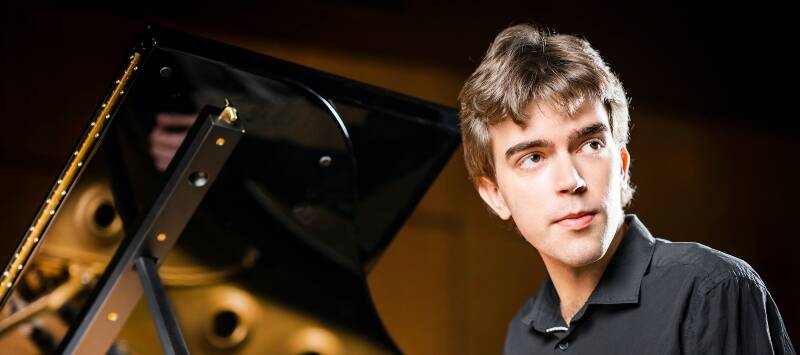Note: Next week, virtuoso Dutch/Spanish pianist Albert Cano Smit will take the stage, not once but twice, in the Kay White Hall of Vashon Center for the Arts.
On Thursday, April 11, at 7:30 p.m., Cano Smit, Vashon soprano Holly Johnson, and local pianist and composer Chris Overstreet, will join local musicologist Michael Tracy in a “Talks on the Rock” lecture and concert that celebrates the Spanish composers Albeniz, Granados, de Falle, and Mompou.
The next night, at 7:30 p.m. Friday, April 12, Cano Smit will present a solo recital, “Musical Evening from Spain,” which will also include some Bach preludes and fugues.
Following is an interview of Cano Smit by Michael Tracy, who is excited to welcome him to the stage for both events.
Tell us how you decided on your April 12 program.
I immediately thought that was a beautiful way to explore the musical world of Spain. The legacy of Spanish composers is so strong there, but I somehow didn’t appreciate them fully until I left the country. I find their music a sensory overload of rhythm, harmony, and in an abstract way, flavor, and color. It’s incredibly attractive music, which still somehow manages to embody the spirit of the Iberian Peninsula in a raw but very profound way.
It feels personal to me, since it brings back a multitude of deep feelings I had in my childhood. When we are children, we experience unfiltered emotions perhaps even more vividly than we do as adults. That’s why I decided to pair it with Bach, which also brings me back to my childhood and my upbringing in a Catholic monastery’s boarding choir school in Montserrat.
On paper they seem opposites, but I don’t think that implies they can’t work together.
In your recital, we will hear selections from Las Goyescas, by Enrique Granados. When I first heard Alicia de Larrocha’s recording, I asked myself, “Who is this Spanish Chopin?”
That recording is legendary! Granados, much like Chopin, was a great virtuoso who knew how to write for the piano, and what felt good for the pianist, physically, to play. He may not have had the same weight as Chopin in the music world, but Goyescas is one of the most important piano suites in the 20th century.
And much like a lot of Chopin, this suite is incredibly operatic — but perhaps in a way closer to Wagner than to the bel canto composers. In the lecture, we’ll hear Requiebros, el Fandango y el Candil, and el Amor y la Muerte. Each has a separate and contrasting Goya print associated to it, but the style throughout is beautifully evocative, infinitely rich in chromaticism, and deliciously unpredictable to a degree that it feels almost unashamedly improvisatory.
You’ll present selections from Isaac Albeniz Iberia Suite (1910), which totals four books and that evoke castanets, guitar or a Moorish singer, within the same phrase. Which ones have you chosen?
We’ll hear Evocación and El Puerto. I wish there was space for more. Evocación manages to suspend time like no other piece in the entire Spanish output of that era. There are subtle hints at dances, such as the fandango, but it is always from a distance. El Puerto is said to be inspired by Cádiz’s harbor of Santa Maria. It combines three different dances from Andalucía, the region where my dad was born. It feels much sunnier, but Iberia always seems to hint at hidden layers underneath.
We will also hear the music of Frederic Mompou, who I often describe as the Catalan Eric Satie. To an amateur pianist, Mompou seems very doable. Your opinion?
That’s a good way to put it! Though I get the impression that Mompou wasn’t so concerned about challenging technique or even about what other people thought of his music. His music has a certain innocence, as if it came to him from without … I could imagine a small amateur kid playing Mompou beautifully, without a single intrusive thought.
The difficulty in performing as an adult would be comparable to the difficulty of meditating in public.
Find out more and get tickets to both to the “Talks on the Rock” lecture/concert on Thusday, April 11, and Cano Smit’s solo recital on Friday, April 12, at vashoncenterforthearts. Tickets to the lecture are free with the purchase of a ticket to the April 12 recital.



